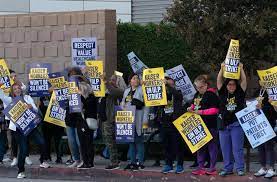
In one of the largest healthcare worker strikes in recent US history, over 75,000 employees at Kaiser Permanente have walked off the job as efforts to resolve a dispute over staffing levels and wages have failed. This strike, affecting America’s largest non-profit healthcare organization, unfolds in a year marked by a surge in inflation, leading to labor strikes demanding better pay and conditions across the United States, from Hollywood to Detroit.
The strike by union members at Kaiser Permanente commenced in the early hours of Wednesday, starting at sites in Virginia and Washington, D.C. It is slated to expand to the West Coast later in the day, where the majority of the company’s workforce is situated.
Kaiser Permanente has implemented contingency plans to mitigate the impact of the strike, but it has cautioned customers to anticipate “longer than usual” wait times, according to a statement posted on its website.
The three-day walkout, organized by the Coalition of Kaiser Permanente Unions, an umbrella group representing local unions, has been described as “the largest healthcare worker strike in US history.” The union’s demands include across-the-board pay raises and safeguards against subcontracting and outsourcing of labor.
The union has warned of potential further strike action in November if Kaiser Permanente continues to engage in unfair labor practices.
In response, Kaiser Permanente expressed its disappointment with the strike and affirmed its commitment to keeping medical centers operational throughout the three-day walkout. The organization stated, “Our medical centers will remain open during the strike and will be staffed by our physicians and trained and experienced managers and staff.”
This strike comes amid a year of heightened industrial action in the US, driven by rising inflation that has eroded workers’ purchasing power and concerns about the automation of jobs due to the rise of generative artificial intelligence (AI).
In Detroit, more than 25,000 workers, representing around 17 percent of the United Auto Workers (UAW) union’s 146,000 members, are on strike across 21 states in the first-ever joint strike action against major automakers, including GM, Ford, and Stellantis (Chrysler). They are demanding higher pay and improved working conditions.
Meanwhile, in Hollywood, a prolonged strike by writers and actors disrupted California’s thriving film industry, halting the production and broadcast of major movies and TV shows. While writers have reached a deal to return to work, actors represented by the SAF-AFTRA union remain on strike as final negotiations with major studios continue.
Sources By Agencies


